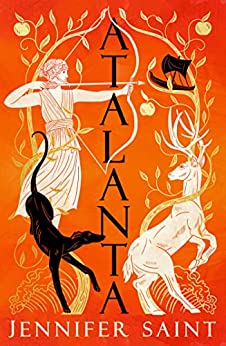Alexandra Pierce Reviews Atalanta by Jennifer Saint
 Atalanta, Jennifer Saint (Wildfire 978-1-4722-9215-5, £16.99, 369pp, hc) April 2023. (Flatiron Books 978-1-25085-557-2, 304pp, $28.99, hc) May 2023.
Atalanta, Jennifer Saint (Wildfire 978-1-4722-9215-5, £16.99, 369pp, hc) April 2023. (Flatiron Books 978-1-25085-557-2, 304pp, $28.99, hc) May 2023.
Atalanta is the third of Jennifer Saint’s stories from Greek mythology, following Ariadne (2021) and Elektra (2022), and Atalanta is a very different character from those two: Elektra’s story revolves around being a daughter and a sister, while Ariadne is a daughter and a lover. At the heart of Atalanta’s story is her abandonment as an infant, so family is irrelevant; instead her central relationship is with the goddess Artemis. It’s indicative of the enduring popularity of Greek and Roman mythology that Atalanta is published concurrently with Luna McNamara’s Psyche and Eros, not to mention Claire North’s Songs of Penelope (and several other adaptations). These authors are all following in the classical traditions of Euripides and Apuleius, presenting their own interpretations of the stories.
There are three key moments in Atalanta’s story. Her main claim to fame is that she was the only woman to be an Argonaut – that group of ‘heroes’ who set off with Jason on his ship Argo to steal the Golden Fleece from the king of Colchis. In this iteration, Atalanta sets out to be part of that crew on the command of Artemis, her patron, who wishes to have a part of the glory that will be won by this group if they succeed. She is grudgingly allowed to join, but very few of the men want anything to do with her, with the exception of Meleager – with whom she ends up in a sexual relationship. Atalanta has sworn to Artemis that she won’t marry, and she seems to hope that the fact that she doesn’t exchange vows with Meleager (who is already married anyway) might mean Artemis can overlook the no-longer-a-virgin bit. (She doesn’t and won’t.) On the voyage, Atalanta proves her worth – she is an exceptional archer, and the fastest of any of the Argonauts over land. After the voyage of the Argo, Atalanta is at a loss for what to do, having no interest in helping Jason as he strives for his kingdom. Instead – the second key moment – she joins Meleager and a few other Argonauts as they go to confront the Calydonian boar. Her presence on the hunt is controversial and leads to tragedy for Meleager. Thirdly, there’s the footrace for Atalanta’s hand in marriage: she declared she would only marry the man who could beat her, knowing that no man ever could. The myths say that Atalanta is distracted by Hippomenes tossing golden apples in her path, suggesting that as a woman Atalanta was easily distracted. It is only in this part of the story that Saint challenges the traditional narrative, proposing a much less sexist explanation for the events.
Clearly, Greek mythology continues to offer wellsprings of narrative ideas. Where Claire North seeks to radically re-imagine this mythology in her Songs of Penelope trilogy – including by inventing entirely new scenarios – Saint presents the stories largely as they have come down to us. Both approaches have their place, and Saint does spend more time on the realities of life for women and the motivations of her character than was present in any of the original sources. One thing I found surprising and a bit depressing is that Saint chose to follow a fairly traditional line with the character of Medea, daughter of the king of Colchis and the reason Jason ends up achieving the Golden Fleece. She is called a witch, and while that’s not cause for burning at the stake, it does cause some suspicion. Her devious ways rob the Argonauts of a chance for glory, and she is responsible for the death of her brother as well. Saint nods to a dreadful family history, but it’s perfunctory; there’s little interest in developing Medea as a rich character.
Perhaps the most intriguing character for me throughout the story was Artemis. Saint makes no attempt to soften her: she is the virginal huntress, ruthless in killing any men who dare try to spy on her, and equally ruthless in her condemnation of any of her devotees who break their vow by having sex, even when it was rape. I appreciated that this Artemis is approachable in some ways – she helps desperate mothers in labor – but is simultaneously utterly alien and unknowable. On the other hand, Atalanta is a very straightforward character. Having been raised by a bear, and then by Artemis and her nymphs, Atalanta has little interest in guile or dissembling. She does conceal her relationship with Meleager from the other Argonauts, because she is sensible to the negative repercussions that would result, but the reader is never left confused by her actions or motivations.
Well-paced and well-written, this is an admirable novel for readers craving more women from Greek mythology in their reading diet, bringing one of the lesser-known women to prominence.
Alexandra Pierce reads, writes, podcasts, cooks and knits; she’s Australian and a feminist. She was a host of the Hugo Award winning podcast Galactic Suburbia for a decade; her new podcast is all about indie bookshops and is called Paper Defiance. Alex has edited two award-winning non-fiction anthologies, Letters to Tiptree and Luminscent Threads: Connections to Octavia E Butler. She reviews a wide range of books at www.randomalex.net.
This review and more like it in the July 2023 issue of Locus.
 While you are here, please take a moment to support Locus with a one-time or recurring donation. We rely on reader donations to keep the magazine and site going, and would like to keep the site paywall free, but WE NEED YOUR FINANCIAL SUPPORT to continue quality coverage of the science fiction and fantasy field.
While you are here, please take a moment to support Locus with a one-time or recurring donation. We rely on reader donations to keep the magazine and site going, and would like to keep the site paywall free, but WE NEED YOUR FINANCIAL SUPPORT to continue quality coverage of the science fiction and fantasy field.
©Locus Magazine. Copyrighted material may not be republished without permission of LSFF.






